Writing on Writing is a Method of Encounter. Correspondences with Ursula K. Le Guin and the World [Redux]
Main Article Content
Abstract
What can writing as creative practice teach us about writing as a research method? By examining the technique of ‘writing on writing’ in the textual theory of Ursula K. Le Guin, this article investigates writing as a dynamic and open-ended tool that gathers author(s) and text(s), and inquiry and world. This technique motivates ‘correspondence’, in the twofold sense of learned exchange and conceptual alignment. We analyze and enact ‘writing on writing’ by making one version of our argument (the spoken script of a conference presentation) into the starting point for another (the written text of the present article). Layered annotations and comments show how revision, review, response, and exchange collapse the form and content of research, pulling focus on its presence (for the ‘author’ in action) and consequence (for the ‘world’ under description). If writing is a tool for thinking, what is learned in the spacetime of hesitation between draft and text? What kind of reading practice follows when a text is finite and open-ended, provisional and iterative?
Downloads
Article Details

This work is licensed under a Creative Commons Attribution-ShareAlike 4.0 International license.
COPYRIGHT NOTICE
All contents of this electronic edition are distributed under the Creative Commons license of "Attribution-ShareAlike 4.0 Internacional" (CC-BY-SA). Any total or partial reproduction of the material must mention its origin.
The rights of the published images belong to their authors, who grant to Diseña the license for its use. The management of the permits and the authorization of the publication of the images (or of any material) that contains copyright and its consequent rights of reproduction in this publication is the sole responsibility of the authors of the articles.

